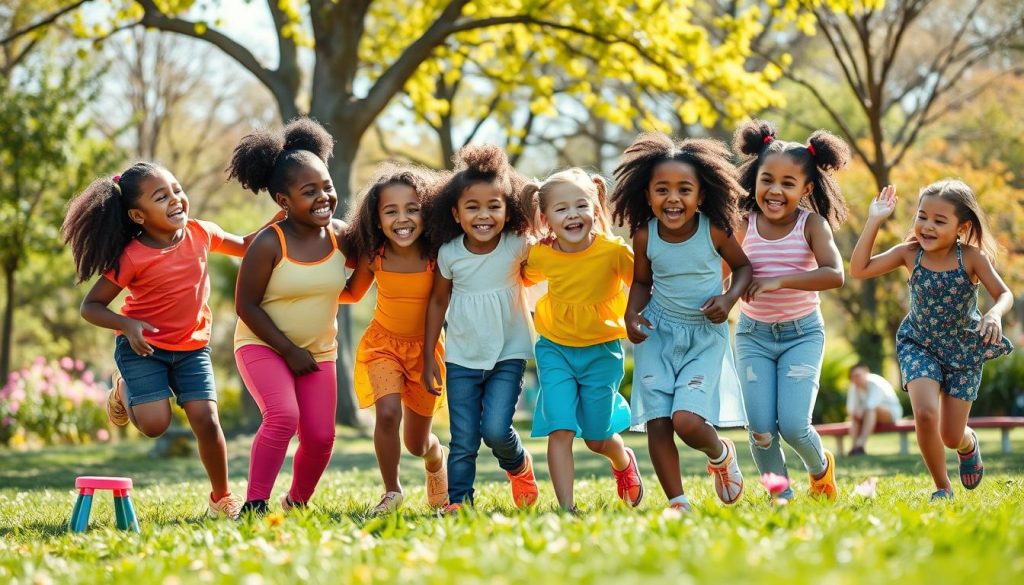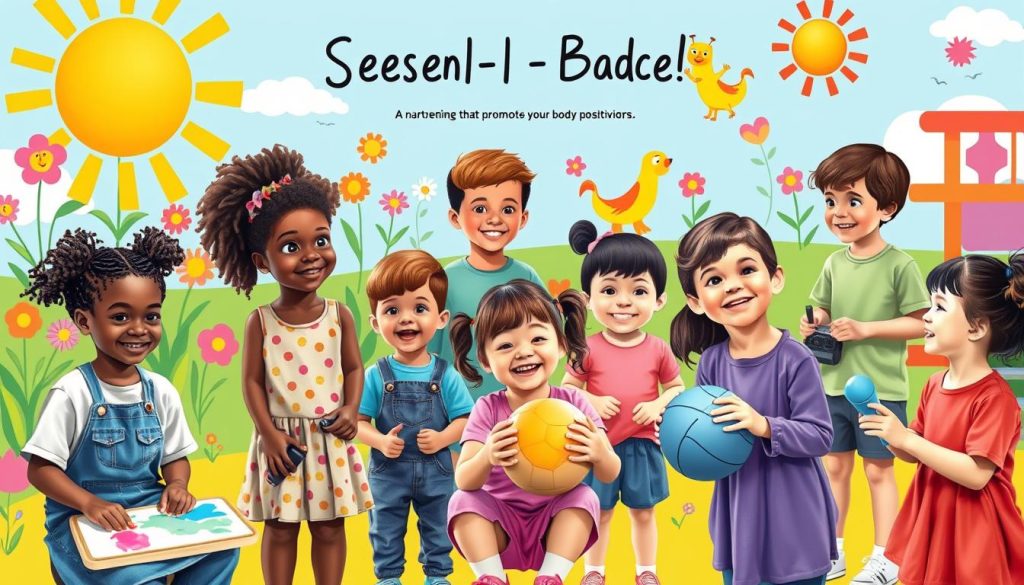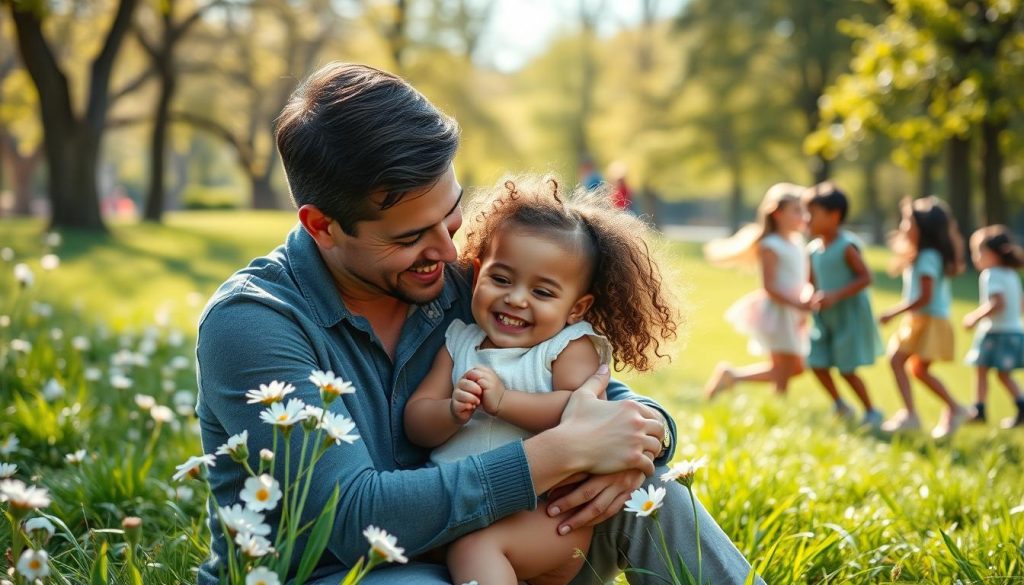Ever thought about teaching your kids to love their bodies in a world full of beauty standards? It’s tough, especially when you’re dealing with body image issues yourself. But, talking about it early and gently can really help your kids feel better about themselves.
Experts like Ana Reisdorf say our culture pushes unrealistic body ideals on everyone, even kids. Sadly, eating disorders in children are on the rise, affecting even the youngest. So, teaching body positivity is more important than ever.
Creating a home where everyone feels accepted and healthy is key. Victoria Yates, a body image coach, says teaching kids to accept their bodies helps everyone feel good. It’s about showing that all bodies are healthy, not just the small ones.
Key Takeaways
- Start conversations about body positivity early using gentle parenting techniques.
- Recognize the impact of societal pressures and media portrayals on children’s self-image.
- Promote a balanced relationship with food by avoiding labels like “good” or “bad.”
- Encourage physical activities that children enjoy, which also enhance their mood and social skills.
- Role-model positive self-talk and body acceptance to counter unrealistic beauty standards.
Understanding Body Positivity and Its Importance
Body positivity is about loving and accepting your body, no matter its shape or size. It’s especially important for kids and teens who start to worry about their bodies early. Jennifer Hagman, MD, says it greatly affects their mental health and how they feel about themselves.

Defining Body Positivity
Teaching kids to love their bodies without judgment is key. This step, called body neutrality, helps them move away from negative body thoughts. It’s a big step towards self-acceptance.
The Impact of Unrealistic Beauty Standards
Our society often sees thinness as the only beauty. Kids as young as five start worrying about their bodies. A Dove Self-Esteem Project survey shows 60% of girls and many boys feel bad about how they look.
Why Body Positivity Matters for Kids
Teaching kids to love their bodies is crucial for their self-esteem. It helps them enjoy physical activities and eat healthily. But, negative body image can lead to eating disorders.
By teaching that all bodies are good, parents can protect their kids from harmful beauty standards. This helps their mental and physical health.
Setting the Foundation: What is Body Positivity?
Body positivity is about accepting the natural differences in human bodies. It teaches us that every body is unique and valuable. This helps in discussing body diversity with kids, which is key to building self-esteem in kids and promoting a positive body image. It’s important to reject unrealistic beauty standards from a young age.

Young kids are easily influenced by media that shows unattainable beauty. These messages can harm their self-worth and how they see themselves. But, you can teach body positivity early on. This helps kids develop a positive self-image and boosts their confidence.
Teaching kids to use positive self-talk is crucial. Saying “I am strong” or “I feel great in my own skin” helps build confidence. This positive talk can fight off negative influences and support their mental health.
Parents are key in shaping how kids see their bodies. By focusing on health over looks and being mindful of body talk, you set a great example. Rejecting unrealistic beauty standards means celebrating diversity and praising kids’ abilities, not just their looks. This helps kids value themselves based on who they are, not just how they look.
Creating a space where kids can be themselves and talk about body image is important. By celebrating diversity and encouraging self-expression, you help your kids build a strong foundation of body positivity. This foundation will help them in adulthood.
Being a Positive Role Model for Your Children
Parents are the first and most important role models for their kids. How you talk about your body and eating habits affects your children. Being a positive role model is key to helping your kids avoid negative self-image.

Modeling Positive Self-Talk
Positive self-talk helps kids think better of themselves. If you talk about your body with kindness, your kids will too. Share positive thoughts and show how to deal with self-doubt in a healthy way.
Discussing Body Diversity
Talking openly about body diversity teaches kids that all shapes are natural and good. Encourage them to see and value different sizes and looks. This helps them understand that beauty comes in many forms.
Handling Your Own Struggles Gracefully
Dealing with your own challenges in a healthy way teaches kids resilience. Show them that it’s okay to not be perfect. Be honest with your kids about your struggles and the importance of self-love.
Developing a Healthy Relationship with Food
Teaching kids to love food in a healthy way is key for their happiness and health. It’s not just about what they eat, but how they feel about it. Show them the good in all foods, not just some. This helps avoid the bad feeling of some foods being “good” and others “bad”.
Promoting Nutritional Awareness
Teaching kids about food is more than just listing what they should eat. It’s about understanding how food helps their bodies. But, remember, food can also be a comfort during tough times. This can lead to unhealthy eating habits.
Teaching them about food can be fun. Take them shopping and cooking. This makes learning about food a fun, hands-on experience.
The Pitfalls of Labeling Foods as “Good” or “Bad”
Calling foods “good” or “bad” can confuse kids. It makes them feel guilty about what they eat. This can lead to unhealthy eating habits.
Use simple, positive language when talking about food. Show them how different foods can give them energy. Also, limit their screen time to avoid bad food ads.
Encouraging Intuitive Eating
Experts like Victoria Yates suggest teaching kids to listen to their bodies. This helps them eat in a balanced way. It’s also good for parents to eat intuitively, as kids learn from them.
Online family therapy can help with food and body issues. Letting kids choose healthy foods and be active helps them feel good about food. This boosts their overall health and happiness.
FAQ
How can I teach body positivity to my kids even when I’m struggling with it?
What defines body positivity?
How do unrealistic beauty standards affect children?
Why is teaching body positivity important for kids?
What are some ways to discuss body diversity with my children?
How can I model positive self-talk to my children?
What should I keep in mind when promoting nutritional awareness to my kids?
Why is labeling foods as “good” or “bad” harmful?
How can I encourage intuitive eating in my children?
What role does screen time play in children’s body image?
How can family budgeting support healthy eating habits?
When should I consider online family therapy for body image or eating issues?
This post contains affiliate links. If you click on a link and make a purchase, I may earn a small commission — at no extra cost to you. Thank you for supporting this blog and helping me keep the patterns free! Read the full Affiliate Disclosure & Transparency.
